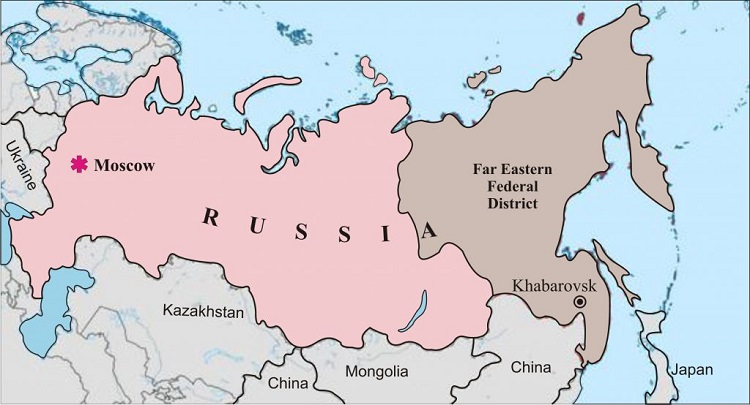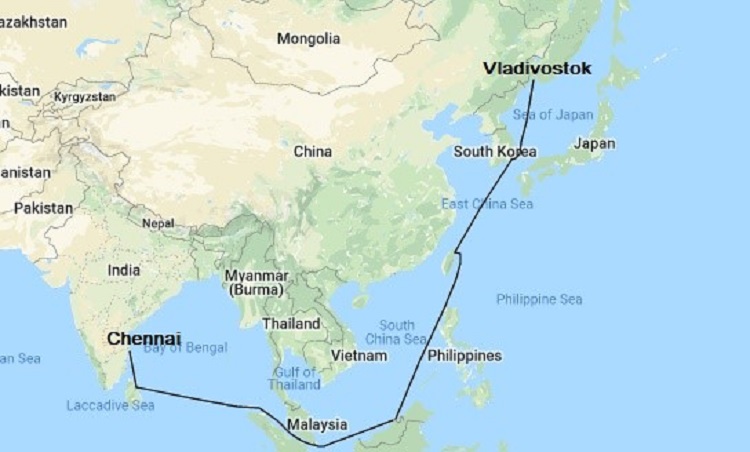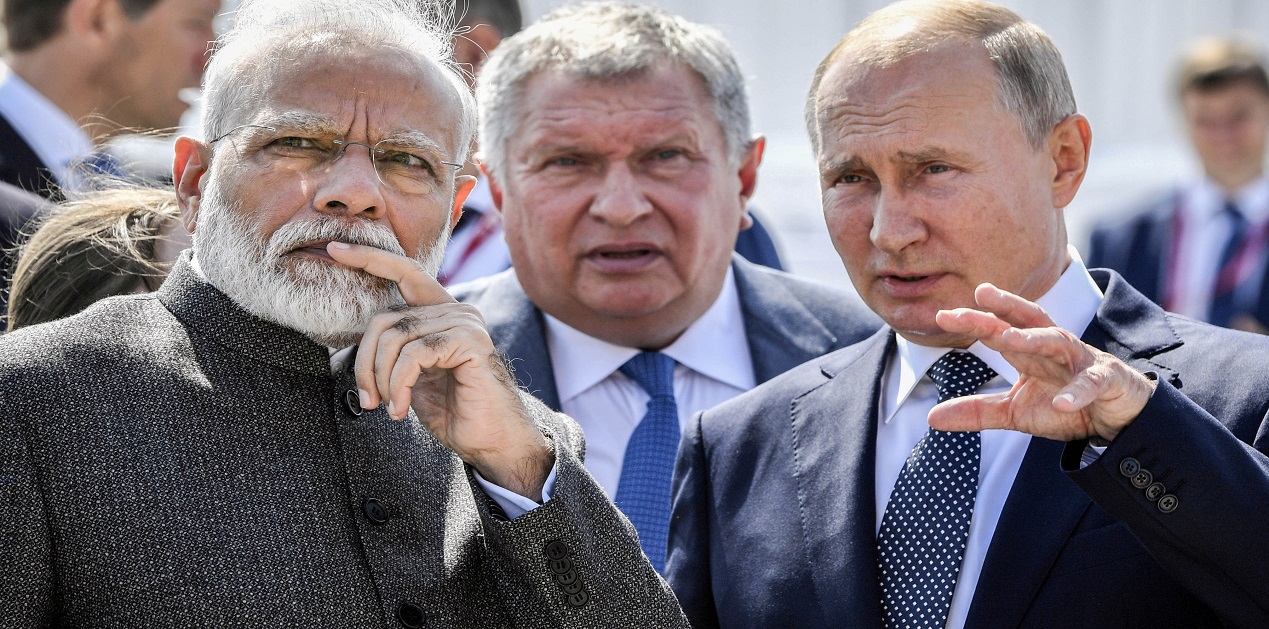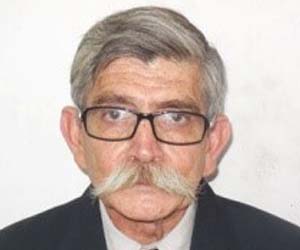Indian Prime Minister, Sri Narendra Modi, visited Vladivostok in Far East of Russia for two days; 04-05 Sep 2019. The PM had two main agenda points: First, to attend 20th Summit Level talk with the Russian President, Mr. Vladimir Putin; and second, as the Chief Guest of the 5th Eastern Economic Forum. During his visit, 15 agreements/MoU were signed. The im-portant ones were as follows:-
- Production of spare parts for Russian/ Soviet Military Equipment- this will give a boost to military industrial complex of India besides reducing the down time of the mili-tary equipment of the erstwhile Soviet/ Russian equipment.
- Maritime Communication between Chennai and Vladivostok - this is a significant devel-opment which will not only reduce the travelling time between the two locations, but will also help Russia and India to break the stranglehold of China over the South China Sea.
- Transportation of the natural gas from the region to energy starved India.
- Expansion of cooperation between India and Russia in the field of oil and natural gas sector.
- Cooperation in coking coal mining projects implementation in the Russian Far East.
- Investment collaboration.
- Cooperation between Federation of Indian Chambers of Commerce and Industry (FIC-CI) and Roscongress Foundation.
- Cooperation between FICCI and Autonomous Non-Profit Organisation Agency for stra-tegic initiatives to promote new projects.
- MoU between Joint Stock Company NOVATEK and PETRONET LNG Limited on cooper-ation with respect to the joint development of the joint development of the downstream Liquefied Natural Gas (LNG) Business and LNG Supplies.
President Putin said in his joint statement that Russia was planning to setup 20 nuclear plants in next twenty years. It was also decided to enhance cooperation to push high tech sector trade volume to $ 30 billion by 2025 and mutual investment to $ 15 billion by 2025.
The cooperation has been improving in recent times more in terms of being partners rather than supplier to client relationship. Some of the important outcomes that came out from the joint declaration were as follows:-
- Expanding multifaceted bilateral trade and economic cooperation, specially in high tech areas.
- Expanding the participation of Russian business in 'Make in India' programme and that of Indian companies in investment projects in Russia.
- India is ready to play a significant role in the Arctic Council.
- Design and manufacture of Vodo-Vodyanoi Energetichesky Reaktor (Russian of Water-water Energy Reactor, VVER) 1200 nuclear plant and fuel. It was also decided to expand the scope to establish nuclear power plants in third countries. In this connection coopera-tion for the establishment of the Roopnagar Nuclear Power Plant in Bangladesh (a joint venture of India and Russia) was decided to be the model for future cooperation.
- Discussion of export of Coking Coal from Far East to India was taken up.
- Cooperation in geological exploitation and joint development of oil and gas fields in Russia and India.
- Joint research and development in the areas of railway, civil aviation, space, science and technology particularly in high tech areas and in the areas of new technologies.
- Joint development of space launch vehicles, space crafts including inter planetary ex-ploration, and manufacture of civil air crafts. Russia also offered full cooperation for In-dia's ‘Gaganyan’ Mission.
- Russia will continue to support India's candidature for permanent seat in UNSC.
- Cooperation to combat terror, military to military dialogue, joint exercises and training in each other's institution.

(Source: Arkhipova Yuliya Aleksandrovna and Bubnova Marina Borisovna, “A proposal for ecological and geological monitoring of mining enterprises in the Far Eastern region of Russia”, pub in European Geologist Journal 45 and uploaded on http://eurogeologist.eu)
The Far Eastern Region of Russia stretches between Lake Baikal in West to Pacific Ocean in the East. As shown in the Map-1 above, this area shares border with China, Mongolia, North Korea and Japan (only maritime boundary). Eastern Economic Forum is an interna-tional forum held each year since 2015 in September, at Far Eastern Federal University in Vladivostok, for the purpose of encouraging foreign investment in the Russian Far East. The Russian president and the Japanese premier have attended this forum since its beginning. Far East Economic Forum is sponsored by the organizing committee appointed by Roscon-gress, an association of the Russian Government, which also sponsors other international forums, such as St. Petersburg International Economic Forum. The area is highly rich in min-eral wealth; specially in oil and natural gas resources. Also it is still relatively less explored and exploited. Realising its importance India opened a consulate in Vladivostok in 1992 and has maintained regular engagement with the area.

(Source: Andrei I. Torin, “Interview: India-Russia Relations and the New World Order”, pub in The kootneeti.in dated 30 Jul 2019)
For the 5th Eastern Economic Forum, which was scheduled to have started on 05 Sep 2019, Indian Prime Minister Narendra Modi was invited as the chief guest for the meeting. Other dignitaries who attended this meeting were; Prime Ministers of Japan and Malaysia, Presi-dent of Mongolia and a ministerial representative of Indonesia besides President of Russia. Prime Minister Modi during his address pledged a credit line of $ one billion for the devel-opment of this area. It was also decided to develop a sea link between Vladivostok and Chennai, which will reduce travelling time; from 40 to 24 days. There are common interests of both Russia and India in the development of Far Eastern Region of Russia. Some of the important aspects are as follows:-
- Vladivostok-Chennai Sea Link - The Sea link between Vladivos-tok and Chennai is being seen by both India and Russia as a counter to China's Mari-time Silk Route (MSR) Plan as a part of One Belt One Road (OBOR) project. It is ex-pected to become an extension of the existing India Japan Pacific Corridor to Indian Ocean Corridor which China considers as challenge to its maritime OBOR plan and her hegemony in South China Sea. As far as India is concerned it is an extension of her 'Act East' policy which now becomes 'Act Far East' policy. With ONGC Videsh Limited (OVL) stakes in Sakhalin off shore Region of Far East and Vankor & Imperial Energy in Eastern Siberia and Vietnam off shore maritime domain, this link assumes great importance. In this connection it is also relevant to note that Indian Oil Corporation (IOC) and its partners picked up 29.9% stake in a separate Taas-Yuryakh Oilfields in East Siberia. On the part of Russia; ROSENEFT bought Essar Oil for $ 12.9 billion, which operates Vadinar oil refinery in Gujarat. Thus this link is likely to become a counter to China's 'String of Pearls'. Besides energy sector there are two more areas which are worth mentioning. India has invested in other natural resources like dia-monds and with recent visit of four chief ministers of India; namely; Haryana, Gujarat, Uttar Pradesh and Goa; representatives of 140 companies under Industry and Com-merce Minister during 11-13 August 2019 to this area, agriculture joint ventures in industry are other sectors which will become important in coming days. With all this trade and commerce with this area will increasingly become bigger and bigger and thus the relevant of this Sea Link.
- Steady Erosion in the Supply of Russian Gas to Turkey and South East Europe - In recent times gas supply to Turkey and South East Europe by Russia has been squeezed due to cheaper LNG and Gas from Azerbaijan. In first half of cur-rent year supply to Turkey has dropped by 36% and to Greece by 12.6 percent and Bulgaria by 17 percent. Russia has to find new market and India which is energy defi-cient can fill that gap. In this connection a visit by Mr. Modi to Zvezda Ship Building Complex located in Bolshoey Kamen area of the region is significant. Besides building all types of warships it also builds LNG ships. India needs LNG ships to transport su-per-cooled LNG from its facilities and Russian facilities to India for refining. This co-operation in ship building will also help beleaguered local shipyards of India to get work in all kinds of ship building. In this connection it needs to be noted that in the LNG supply chain, the cost is quite a concern. First in chain is LNG terminal at both ends and the second is the ship which transports the LNG. Recently, a terminal was constructed at Ennore at a cost of Rs. 5151 crore. Incidentally this port is quite close to Chennai and will be of great value when Valdivostok- Chennai Sea Link becomes operational. Cost of a ship with capacity of 174 cubic metres which is meant to transport LNG costs $182 million on an average. However there are just about 550 LNG Ships are there in the world therefore chartering is the order of the day but the current cost of chartering a LNG ship on an average is $ 40,000 per day and it is likely to grow to $70,000 by next year due to increase in demand of the LNG due to its low-er cost & lower carbon imprint and unless ship building is taken seriously the re-quirement versus availability of ships will be a limiting factor in future. With saving of 16 days by using this link in any case there will be a substantial saving and sooner In-dia goes for its own ships cost will be further cut.
- Chinese Enchroachment - Russia in recent times is increasingly be-coming concerned about the encroachment by China in sparsely populated Far East. Among other things Russia wants Indian Farmers to be encouraged to do farming in the Far East area. Russia also wants to balance ever-increasing Chinese presence in this region with Indians. Even in the Russian projects besides 80 percent positions re-serve for Russians 20 percent positions which are presently dominated by Chinese , Russia wants Indians to come forward to get a share of these vacancies. India needs to catch on it as it will help her to address the unemployment issue.
In final analysis, it was a very significant visit of PM Modi and once again relation with a country which has stood with India during the thick and thin of problems and this relation-ship needs to be further invested in.
References:-
- Ekaterina Kravtsova, “Russian exports to Turkey, southeast Europe squeezed by LNG, Azeri gas”, A REU-TERS Business Report dated 06 Sep 2019.
- India – Russia Joint Statement during visit of PM to Vladivostok, uploaded on pmindia.gov.in dated 04 Sep 2019.
- Prabhash K Dutta, “Modi at Eastern Economic Forum: Why India is so interested in Russian Far East”, dated 05 Sep 2019, uploaded on indiatoday.in
- A Hindu Report, “India, Russia ink proposal on developing Chennai- Vladivostok Sea Link dated 04 Sep 2019 uploaded on thehindu.com
- Korea’s three ship builders expected to receive orders of LNG Carrier, pub in Ship Building News dated 02 Dec 2017.
- LNG transportation is where the Big Money, pub in General Energy news dated 16 Apr 2019.
(The paper is the author�s individual scho-lastic articulation. The author certifies that the article/paper is original in content, unpublished and it has not been submitted for publication/web upload elsewhere, and that the facts and figures quoted are duly referenced, as needed, and are be-lieved to be correct). (The paper does not necessarily represent the organisational stance... More >>
Image Source: https://www.ft.com/__origami/service/image/v2/images/raw/https%3A%2F%2Fs3-ap-northeast-1.amazonaws.com%2Fpsh-ex-ftnikkei-3937bb4%2Fimages%2F6%2F7%2F9%2F9%2F22429976-1-eng-GB%2F1069984.jpg?source=nar-cms











Post new comment